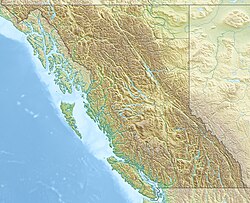| Golden Mountain | |
|---|---|
 | |
| Highest point | |
| Elevation | 2,933 m (9,623 ft) [1] |
| Prominence | 131 m (430 ft) [2] |
| Parent peak | Nasswald Peak 3042 m [2] |
| Listing | Mountains of Alberta Mountains of British Columbia |
| Coordinates | 50°59′56″N115°40′13″W / 50.99889°N 115.67028°W [3] |
| Geography | |
| Country | Canada |
| Provinces | Alberta and British Columbia |
| Topo map | NTS 82J13 Mount Assiniboine [3] |
Golden Mountain is located on the border of Alberta and British Columbia on the Continental Divide.


